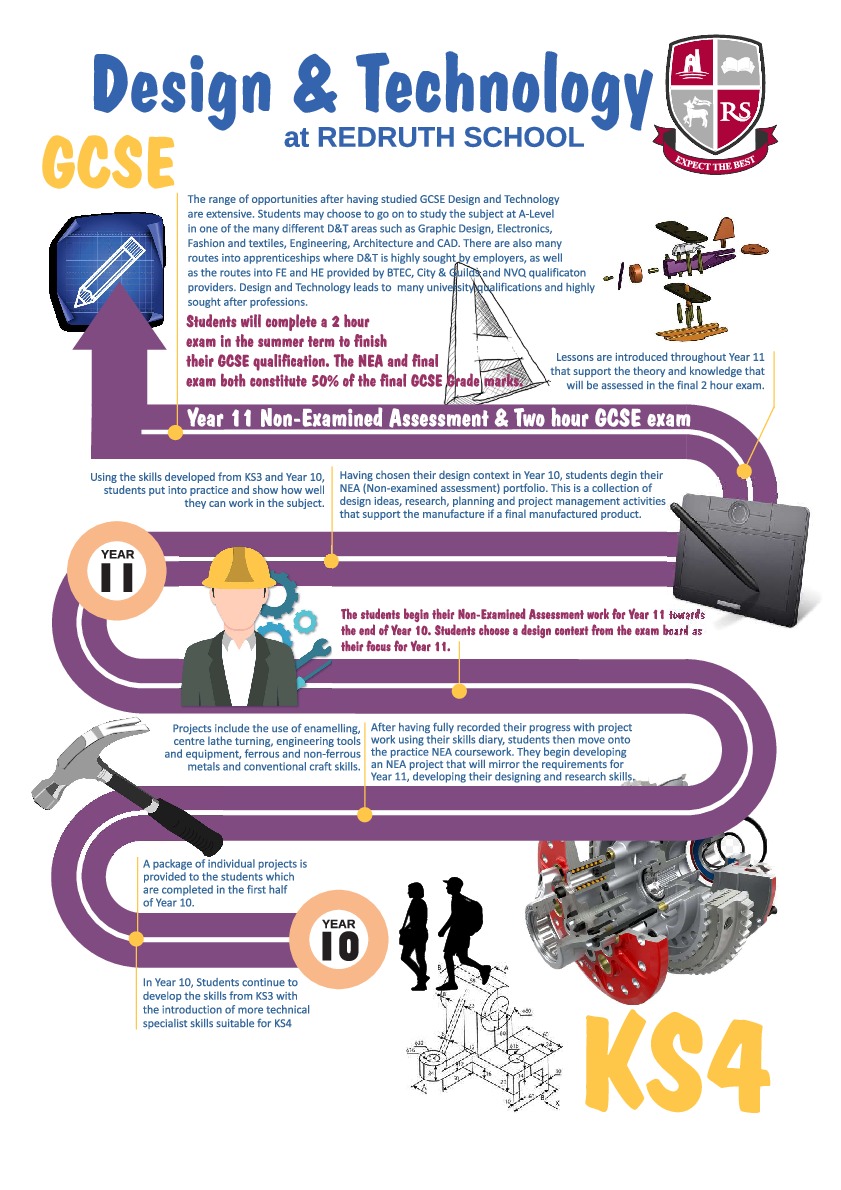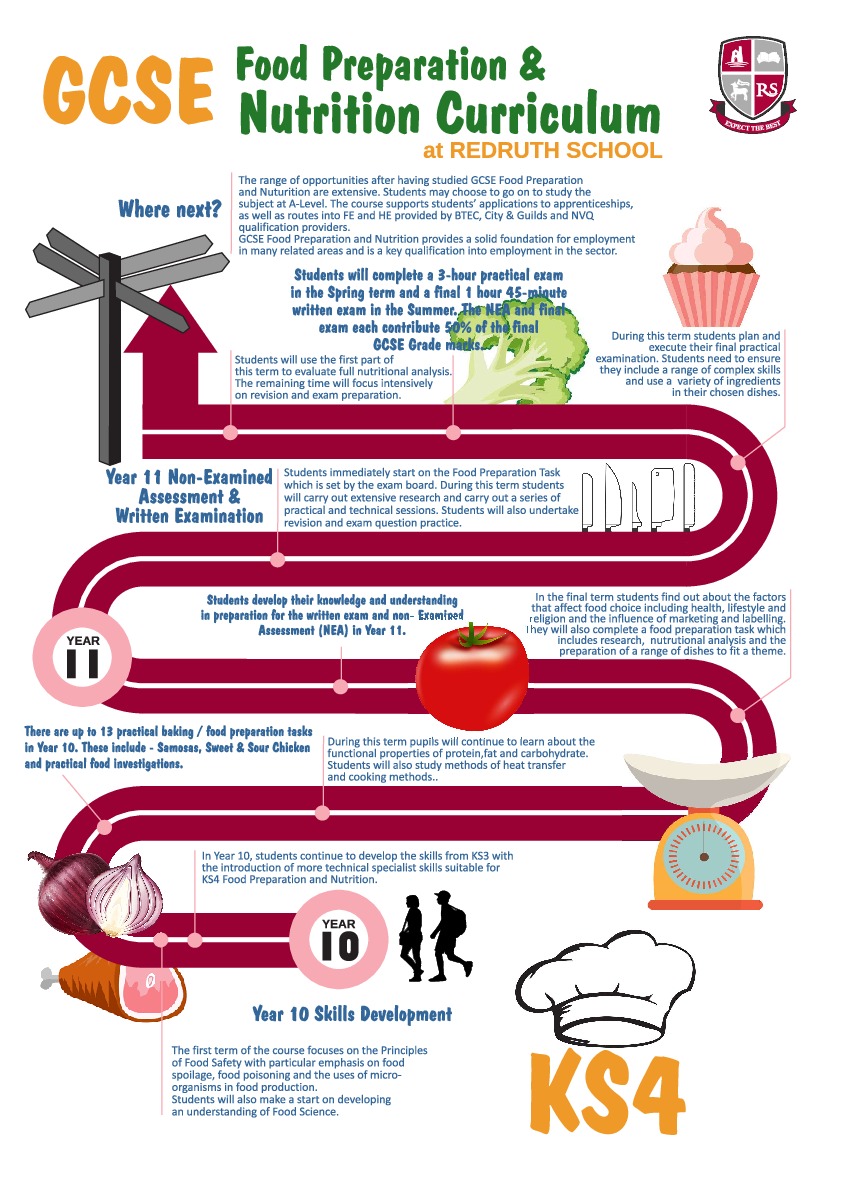- Home
- Students
- Subject Information
- Design Technology
- facebookShare this page on Facebook
- twitterTweet this page
- pinterestPin this page
Design Technology
Design Technology
The Design Technology Faculty at Redruth School encompasses the subjects of Design Technology and Food, Nutrition & Cooking and is delivered by a team of committed specialist teachers. Pupils achieve well and make good progress within DT and we are very proud of each individual’s successes.
Design Technology
Design technology interest and engagement has always been high at Redruth School. The emphasis within DT is learning important skills for the developing technical world, with focuses on Computer Aided Design and Manufacture, comprehension of material choices and developing safe and skilful practical ability.
The department benefits from a wide range of resources that allow students to use traditional techniques as well as modern manufacturing methods including the use of a CNC router, laser cutter and 3D printing.
The department are also active with national initiatives including the “Race for the line “ challenge and Greenpower formula 24 racing, with strong links to engineering supported by specialist engineers from RNAS Culdrose. There is an active STEM club that meet once a week that engages students with practical science and technology investigations.
KS3
The students at Redruth get to complete well thought out tasks during year 7 and 8 that are engaging, fun and are in line with the national curriculum, preparing them well for KS4. In year 7, the students cover electronics, basic carpentry skills and a variety of CAD tasks – including preparing drawings for the laser cutter, leading them to complete a themed Night Light. In year 8, the practical project is independently designed Trinket Box – for a client , students get to cast pewter, develop CAD drawings for 3D printing, and continue to develop carpentry skills to a more advance level. Their knowledge widens rapidly, due to the theoretical content covered in each lesson.
KS4 – GCSE Design Technology
DT is a popular option choice for students, with a variety of projects being taught in year 9 and 10, in preparation for the Non Examined Assessment and 2 hour written paper in year 11. In year 9 students are able to design and make, Low Voltage Lamps (focus on metals), Designer-themed Mirrors (focus on woods) and USB Pens (focus on polymers). In year 10, we carry out a practice NEA based around the theme of ‘family entertainment’ (focus on papers and boards). By presenting the variety of projects listed, students are able to increase the theoretical knowledge and practical skills.

Food, Nutrition & Cooking
KS3
Our Scheme of Learning in Years 7&8 meets the requirements of the National Curriculum which states that:
- Pupils should be taught to understand and apply the principles of nutrition and health. We do this through a variety of class activities and practical lessons. They carry out a range of cooking techniques safely and hygienically including selecting and preparing ingredients using utensils and electrical equipment and applying heat in different ways.
- Pupils should cook a repertoire of mainly savoury dishes so that they are able to feed themselves and others a healthy and varied diet
- Pupils should understand the source, seasonality and characteristics of a broad range of ingredients
KS4 – GCSE Food Preparation & Nutrition
This is an exciting, popular and rigorous course which focuses on building on the knowledge and understanding and skills gained in KS3. Pupils continue to develop a thorough understanding of nutrition, food provenance and the working characteristics of food materials.
The subject theory content is taught within the following five key areas:
- Food, nutrition and health
- Food science
- Food safety
- Food choice
- Food provenance
Pupils will make a range of dishes throughout Years 10 & 11 in which they will develop technical food preparation skills in, for example, preparing fruit and vegetables, sauce-making, dough-making, pastry-making, cooking with meat and fish, using a variety of equipment and presenting food using a range of garnishes and decoration techniques.
Subject content is assessed through a written exam paper at the end of the course which is 50% of the final GCSE. Alongside this are two pieces of Non Examined Assessment (NEA) which make up the final 50% as follows:
Task 1: Food investigation (30 marks) – 15% of GCSE
This assesses pupils' understanding of the working characteristics, functional and chemical properties of ingredients. Pupils are required to complete a series of practical science-based investigations for this task.
Task 2: Food preparation assessment (70 marks) – 35% of GCSE
Pupils' knowledge, skills and understanding in relation to the planning, preparation, cooking, presentation of food and application of nutrition related to the chosen task.
Pupils will prepare, cook and present a final menu of three dishes within a single period of no more than three hours, planning in advance how this will be achieved.

Homework
In Years 7 & 8 pupils are set homework regularly. This could be in the form of a research task, a DODDLE activity or to bring ingredients required for a practical lesson in Food.
In Years 9-11 pupils are expected to complete one piece of homework every week. This is generally a learning/research based homework, an exam question or revision for assessments and exams. Pupils who have opted for the GCSE in Food Preparation & Nutrition will be expected to bring their ingredients as well as any other task set by the class teacher.
How can I help?
- Support your child with their homework, check student planner, and ensure that your child has sufficient time to complete their homework consistently. This includes checking for ingredients for upcoming practical sessions.
- At all key stages asking your son/daughter to talk about their lessons and what they are learning – this will help consolidate their understanding and develop their ideas and knowledge.
- Check the Show My Homework website to make sure homework is completed on time.
- Collect articles from magazines/leaflets/watch programmes on design/food preparation/engineering.
- Relevant revision guides and student workbooks at examination level.
- All exam boards have a website designed to support students.
- BBC bitesize revision.


